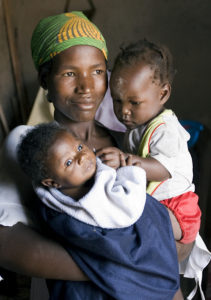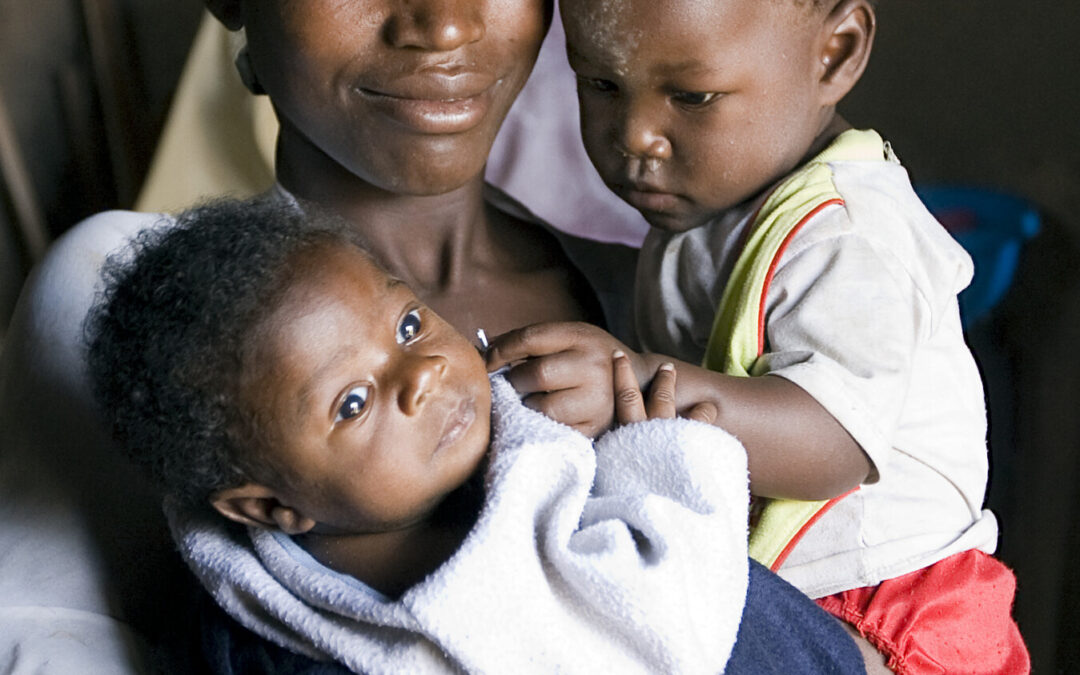
Feliciana Netamba cares for her two children at their home in the Cacilhas village near Huambo, Angola, where the MENTOR Initiative is working to help control malaria. Photo by Mike DuBose, United Methodist News Service.
When your Parent and Child parts buy into what should be tentative conclusions, or guesses, they move away from the truth about a situation. Overgeneralizing words like always, never, all, everyone or no one, only and assume should signal your Adult into quick action. Here’s how overgeneralizing ignites fight-or-flight for a few beliefs: Belief #7 is in effect when you tell yourself that if you work long and hard, it will always lead to the success you wanted. Belief # 5 discourages you from trying when you think you can never overcome the disadvantages of your past. Beliefs # 2 and 3 can trigger intense jealousy if someone else outperforms you in an area where you assume you’ll always come out ahead. Belief # 8 may encourage you to quit looking for your best path because you think that happiness is only and always just what life gives you.
To reduce fight-or flight reactions to always and never overgeneralizing in your toxic beliefs, your Adult must offer Wise Parent phrases like: I’m just guessing about this, but this is what I think now; or from what I know about it, this may work. It’s often best to say, until I get more information, I can’t evaluate this. Your Wise Parent is developed as you revise toxic beliefs and gain wisdom from others. It acts like a bank from which your Adult can withdraw phrases to revise persistent toxic beliefs and quiet fight-or-flight responding.
The best example of humans coming together to manage overgeneralization may be found in the scientific method. It’s designed to prevent people from concluding that things are true based on just a few examples. Testimonials from individuals make the news, but they can’t offer reliable information about most people. Scientists publish articles where they detail how they followed the scientific method in their work. These allow anyone to judge whether their conclusions are close to being true. Here are some steps that the scientific method offers to help you avoid living in a false world:
- When a study is reported it must disclose who funded it. This allows the reader to consider how it might have been biased in favor of the funding group or groups.
- Scientists must define how they’ve selected the participants. Random sampling is the goal for initial selection and important at every step. If this isn’t done, the results can’t be generalized to groups containing a different type of person (gender, age, experience, level of health, ethnic or racial group, etc.) For years all research on breast cancer was done with men, because women’s hormone changes made study more difficult in them. Scientists who conducted these were overgeneralizing if they that the results of a treatment would work the same for women generally as for the men in their studies. Often this did occur.
- There must be a large enough group of people studied for any answers to be considered even partially true. Scientists describe the probability that their findings are true in percentages.
- When large, well-run studies by several respected groups around the world come up with the same results, you can have the most confidence that their findings can be generalized to people in general. After just one study, it’s common for other researchers to run similar studies and find different results. Even one factor that’s different, like reliance on participants from England instead of Kenya, can change the outcome. They’d be overgeneralizing if they claimed that their results would be true beyond England for some issues.
How do scientists guard against overgeneralizing? They document how they perform every step of their studies and encourage others to try to duplicate their work. Because it’s impossible to provide conditions like perfect random sampling, honest researchers will share the limits of how their work can be generalized. Those who do overgeneralize lose the respect and trust of other scientists and their funding. They hurt the progress of science because large research studies are expensive and require the committed efforts of many people, often over many years. In medicine and other areas of research this can be devastating.
Researchers who won’t follow the rules and lie about it may subscribe to Indulgent Parent Belief # 12: If you’re very clever, you can find shortcuts around the frustrating rules in our society. They don’t get away with it because other studies will prove their claims to be false. In medicine they waste precious time when new treatments are badly needed. If their work is overgeneralized, they may harm many people. An example of this is when doctors choose to overgeneralize by prescribing medicine that hasn’t been proven effective or safe for people outside the group that’s been studied.
How can your Adult sift through all the information you receive to identify what’s most likely to be true? Watch for how a scientist or doctor describes it. Do they use the words always or never? Do they refer to reliable sources for their information? Are they respected among other scientists in their field who know the quality of their work? Do they call their findings true or most likely true (which is more accurate) at a certain percentage? Is your doctor recommended by another respected doctor who knows her work? If not, you risk joining the false world of overgeneralization with all the risks it poses.

